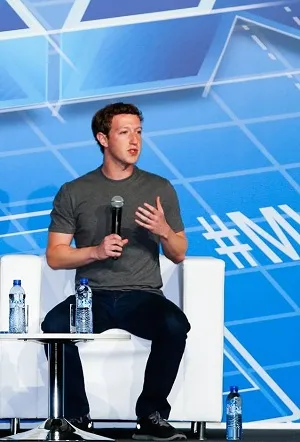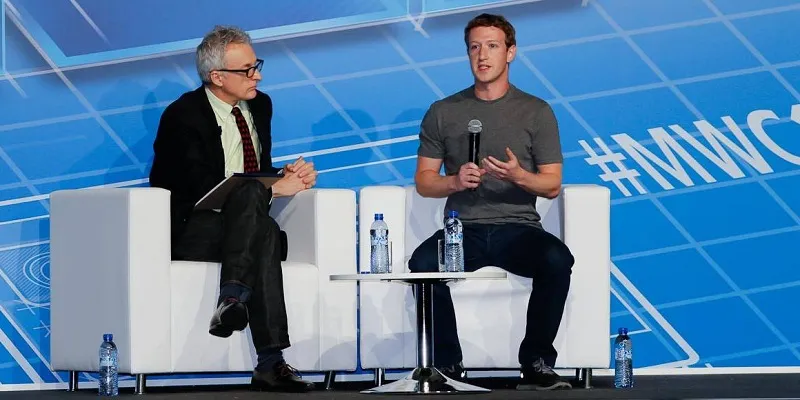Mark Zuckerberg on all things internet at MWC-2014

Becoming the world’s most popular app is not enough for Facebook – it wants to connect everyone in the world to the internet, according to CEO Mark Zuckerberg, speaking at the Mobile World Congress 2014 in Barcelona.I caught Zuckerberg’s conference chat with David Kirkpatrick, author of the book The Facebook Effect. Zuckerberg outlined the vision of Internet.org, the Facebook-led initiative to bring the internet to the two thirds of the world’s population that doesn’t have it.
A key part of this initiative is to bring mobile operators into the Facebook vision of the world. “We can build the model for the mobile industry to deliver the internet to the whole world,” said Zuckerberg. Only a third of people in the world have internet access, and this base is growing slower than it should be.
Mobility is about more than connection – it’s the data and services that mobile internet brings that has the real value, according to Zuckerberg. If you increase internet connectivity in developing countries you can save lives, give jobs and improve education, he said. Facebook recently released a report in this regard called ‘Value of Connectivity.’
80 per cent of the world already lives in an area with mobile coverage, even without initiatives like internet access via high-altitude balloons, said Zuckerberg, perhaps taking a dig at Google’s Project Loon.
However, there is a Catch22 situation – people do not know what the Net is about, and so don’t know how useful it can be to them, explained Zuckerberg; hence his move to reach out to mobile subscribers via partnerships with mobile operators.
“Internet.org is the on-ramp to the internet, the dialtone for the internet,” said Zuckerberg. With free access to Facebook subsidised jointly by the mobile operator and Facebook, the hope is that subscribers will then access other relevant services beyond basic social networking – such as Wikipedia, food and weather information, educational content, and so on, thereby also increasing data revenue for the operators.
Mobile operators such as Globe from the Philippines have already signed on the initiative, and Zuckerberg claimed this experiment will break even soon, thus opening the door to sign deals with other operators as well. Social media helps go beyond text to photos and videos, and can thus reach illiterates also, claimed Zuckerberg.
He claimed his board of directors is in support of his plan. Facebook’s recent move was to acquire WhatsApp for $19 billion dollars, which Zuckerberg justified for its sheer reach, popularity and growth rate.

There is perhaps scepticism from many operators about whether this internet initiative will work as planned, thus explaining why many are not beating down the door to sign up to Zuckerberg’s vision. Ad-supported models for this experiment may not work as well in emerging economies. Besides, messaging via WhatsApp is also eating into mobile operators’ SMS revenues.
It is important to meet the need of operator profits and citizen good, Zuckerberg persevered. “We want to connect everyone in the world, even though we will lose money on this for quite a while, as in the early days of Facebook’s growth,” he said.
The Internet.org vision is also driven by the fact that digital infrastructure costs have been coming down, as well as data usage requirements. Initiatives like Open Compute with open source code along with cheaper servers and switches and more efficient data compression technology are helping Facebook bring down its infrastructure costs. Users can have Facebook sessions with ‘as little as’ 2 Mb per day per user – instead of 14 Mb per day in earlier days, and which will soon come down to 1 Mb per day, claimed Zuckerberg.
Lower costs are also being propelled by cheaper devices, such as Mozilla’s newly announced $25 mobile phone, which Zuckerberg hailed as ‘awesome.’ To showcase the kinds of new services that can be created, Facebook along with Ericsson has conduced hackathons with Spotify and eBay.
Facebook is also learning the hard way about the reality on the ground in emerging markets; its rotational product manager programme requires on-the-ground experience in Africa and Asia.
No one organisation can do it all, governments and operators also need to be roped in, said Zuckerberg. It is also important to address growing concerns about surveillance and loss of privacy online, sometimes referred to as the ‘Snowden effect.’ The US government has crossed the line of trust and transparency, and this could have been avoided, said Zuckerberg.
It is inevitable that such dominant tech firms will need to take on thought leadership roles in digital governance. For example, Google CEO Eric Schmidt recently co-authored the book The New Digital Age: Reshaping the Future of People, Nations and Business. Many other digital leaders have written books on the future of the internet; perhaps we will also see Mark Zuckerberg publishing his own book on the future of Internet.org!







